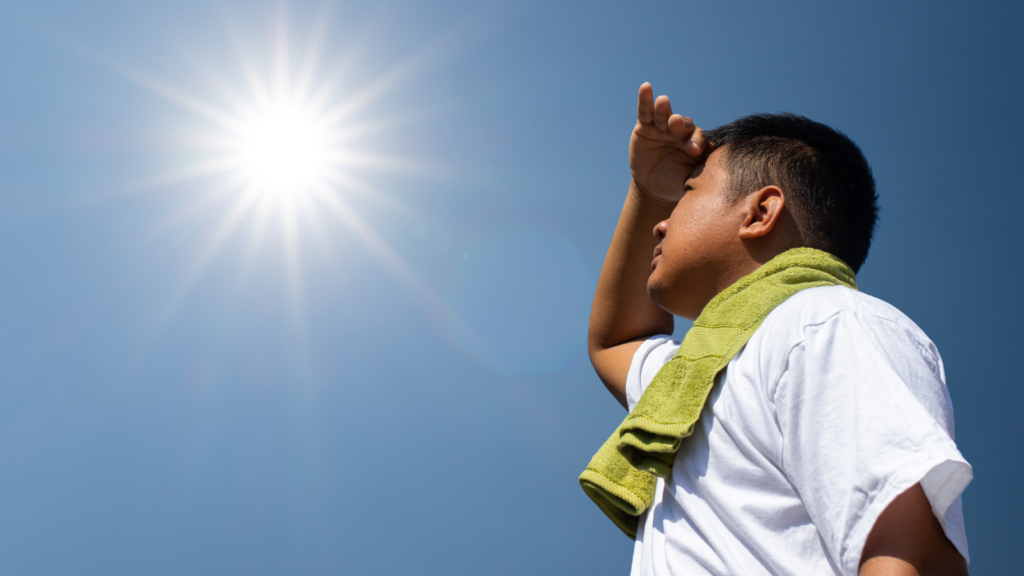
by Latrishka Thomas
The sun beats down mercilessly daily, transforming countries like Antigua into a crucible of rising temperatures.
In 2024, the island is not just experiencing heat—it’s being consumed by it.
Antiguan climatologist Orvin Paige shared that 2024 is on track to be the hottest year on record.
“Mean temperatures have been trending higher in recent years,” Paige says. “The ten hottest years on record for global temperatures have all occurred since 2013.”
Antigua and Barbuda has already experienced climate disruption, with Paige noting that “In 2024, we have seen at least 20 heat waves affecting Antigua and Barbuda.”
Of particular concern is the increase in nighttime temperatures that offer very little respite. “This increase in nighttime temperatures means that the human body has more stress on it to release the high temperatures it was exposed to during the day,” he explains.
The root cause is painfully clear. “The increase in global temperatures has been linked to Climate Change,” Paige states, tracing the destruction to human activity.

He describes a devastating cycle: greenhouse gases destroying the Ozone Layer, allowing harmful ultraviolet rays to penetrate, melting polar ice caps, and threatening low-lying communities.
On the ground, workers are fighting a daily battle against this environmental assault.
In Antigua and Barbuda, questions posed to workers across various fields reveal a concerning pattern of heat-related challenges and inadequate protections.
The findings were gathered from professionals under anonymity, including general construction workers, police officers, security guards, delivery personnel, engineers, electricians, and equipment operators.
The daily reality for professionals involves extensive exposure to intense heat conditions, with 75% of workers reporting they spend eight or more hours per day working in high temperatures.
When asked to evaluate typical heat levels on a scale of 1-10, workers consistently reported severe conditions, with the average rating being 8.
The impact of these conditions on workers’ health and performance is significant. “I’ve been in this field for over ten years,” shares one carpenter. “Working in this heat is tiring, but this is what I do.”

“Most of the time I just want to stop and go relax in AC, but I can’t cause’ I have children to feed. Sometimes I get so dizzy,” says a security guard.
Excessive sweating was the most frequently reported symptom across various roles, with workers citing significant productivity losses linked to heat exposure.
Even more alarming is the fact that most workers have no health insurance, and the one worker who does have coverage reported that their plan doesn’t adequately address heat-related medical treatments.
As one electrician with over 10 years of experience stated, “We don’t have any official heat safety guidelines,” a sentiment echoed across multiple responses.
In the absence of formal protection measures, workers have developed their own basic strategies to cope with heat exposure. “I drink a lot of water,” shares a police officer, while an equipment operator reports relying on “fast water breaks” as their main strategy. A construction worker noted that fans are their primary means of managing heat exposure.
Workers across all specialties stressed the need for heat protection measures. “Conducting training on heat-related illnesses should be mandatory,” said one cop, while an engineer suggested, “creating cooling stations and offering free drinks would make a significant difference.”
A delivery driver recommended schedule modifications, stating, “We need to cut down working hours during extremely hot days.”
Beyond the surface: A deeper look at heat vulnerability
While initial observations might suggest that outdoor workers face the greatest heat risks, expert insights reveal a more complex picture.
An in-depth interview with a local expert on climate change challenges conventional thinking about heat exposure, highlighting that indoor workers without adequate cooling may be equally—if not more—vulnerable.
“I would say in terms of vulnerability, you would think that the most high-risk are people who work outdoors, but I actually think it’s people who work indoors without adequate airflow and adequate cooling,” Antigua’s Climate Change Ambassador Ruleta Camacho-Thomas explains.
The surprising revelation is that outdoor workers often have some natural airflow and are more likely to take heat protection measures, whereas indoor workers may be unaware of their risks.
Camacho-Thomas explained that workplace heat challenges extend beyond simple temperature measurements. She stated that dress codes, building designs, and societal traditions play crucial roles in worker safety.

Traditional office wear—suits, jackets, and ties—can become dangerous in non-air-conditioned environments. Teachers, for instance, face unique challenges with standardised uniforms that may be unsuitable for hot classrooms.
The expert emphasised that everyone—from regulators and contractors to building owners and employees—must become more conscious of heat risks. This means rethinking everything from workplace dress codes to building design.
“As a society, we need to think about this a little bit more,” she stressed. “There’s some personal responsibility to be taken in how we adapt to the increased heat facing us.”
The message is clear: protecting workers from heat is not about implementing a one-size-fits-all solution but about creating flexible, responsive strategies that recognise the unique challenges of each work environment.
—
This story was originally published by The Antigua Observer, with the support of the Caribbean Climate Justice Journalism Fellowship, a joint venture between Climate Tracker and Open Society Foundations.
Latrishka Thomas
🇦🇬 Latrishka is Antigua’s leading court reporter, demonstrating that some of the most compelling stories unfold beyond the newsroom. A first-generation college graduate, she found her way into journalism almost by accident—setting aside her psychology degree for a press pass after spotting a job ad.
5 years later, she has advanced from a newcomer to Senior News Producer at Observer Media, while also coordinating content for Loop Caribbean News. Driven by a commitment to address pressing issues, Latrishka is especially dedicated to climate justice, knowing that today’s biggest stories often focus on our planet’s rising temperatures.
Advertise with the mоѕt vіѕіtеd nеwѕ ѕіtе іn Antigua!
We offer fully customizable and flexible digital marketing packages.
Contact us at [email protected]
















Antigua hot, hot!
I guess global warming is a real thing.
Probably should go to the beach to cool off!!
Government should workers home some times when temperatures hit extreme highs.
Something to think about.
Where was the global warming when i was freezing my behind here this time last year? Big international scheme
So Mr Paige, what was Antigua’s high temperatures 100 million years ago? 100,000 years ago?
Undoubtedly you have boycotted all things that fossil fuels have touched, and if not you’re a goddamn hupocrite.
Comments are closed.